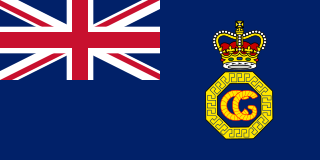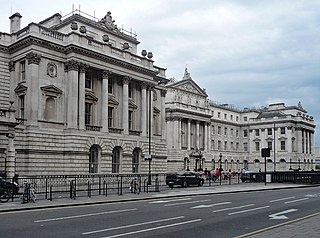
A coast guard or coastguard is a maritime security organization of a particular country. The term embraces wide range of responsibilities in different countries, from being a heavily armed military force with customs and security duties to being a volunteer organization tasked with search and rescue without law enforcement authority. In most countries, a typical coast guard's functions are distinct from those of the navy and the transit police, while in certain countries they have similarities to both.

HM Customs and Excise was a department of the British Government formed in 1909 by the merger of HM Customs and HM Excise; its primary responsibility was the collection of customs duties, excise duties, and other indirect taxes.

His Majesty's Coastguard (HMCG) is the section of the Maritime and Coastguard Agency responsible, through the Secretary of State for Transport to Parliament, for the initiation and co-ordination of all maritime search and rescue (SAR) within the UK Maritime Search and Rescue Region. This includes the mobilisation, organisation and tasking of adequate resources to respond to persons either in distress at sea, or to persons at risk of injury or death on the cliffs or shoreline of the United Kingdom. Since 2015 it has also been responsible for land-based search and rescue helicopter operations.
The Revenue and Customs Prosecution Office (RCPO) was a non-departmental public body created under the Commissioners for Revenue and Customs Act 2005 as an independent prosecution body to take responsibility in the England, Wales and Northern Ireland for the prosecution of criminal offences in cases previously within the purview of the Inland Revenue and HM Customs and Excise (HMCE). In Scotland it was a Specialist Reporting Agency and the cases are then prosecuted by the Crown Office and Procurator Fiscal Service. It was merged with the Crown Prosecution Service on 1 January 2010.

The Philippine Coast Guard (PCG) is the third armed uniformed service of the country attached to the Philippines' Department of Transportation, tasked primarily with enforcing laws within Philippine waters, conducting maritime security operations, safeguarding life and property at sea, and protecting marine environment and resources; similar to coast guard units around the world. In case of a declaration of war, the Coast Guard shall also serve as an attached service of the Department of National Defense.

The Customs and Excise Department (C&ED) is a government agency responsible for the protection of the Hong Kong Special Administrative Region against smuggling; the protection and collection of revenue on dutiable goods on behalf of the Hong Kong Government; the detection and deterrence of drug trafficking and abuse of controlled drugs; the protection of intellectual property rights; the protection of consumer interests; and the protection and facilitation of legitimate trade and upholding Hong Kong's trading integrity.

A border guard of a country is a national security agency that performs border security. Some of the national border guard agencies also perform coast guard and rescue service duties.

HM Customs was the national Customs service of England until a merger with the Department of Excise in 1909. The phrase 'HM Customs', in use since the Middle Ages, referred both to the customs dues themselves and to the office of state established for their collection, assessment and administration.

United States Coast Guard Cutter is the term used by the U.S. Coast Guard for its commissioned vessels. They are 65 feet (19.8 m) or greater in length and have a permanently assigned crew with accommodations aboard. They carry the ship prefix USCGC.

His or Her Majesty's Excise refers to 'inland' duties levied on articles at the time of their manufacture. Excise duty was first raised in England in 1643. Like HM Customs, the Excise was administered by a Board of Commissioners who were accountable to the Lords Commissioners of the Treasury. While 'HM Revenue of Excise' was a phrase used in early legislation to refer to this form of duty, the body tasked with its collection and general administration was usually known as the Excise Office.
Riding Officer was an occupation common during the 18th century around the coastlines of Britain. The principal duty of the office was to patrol the coast within their predefined riding range to suppress smuggling. Their duties included meeting and corresponding with the other riding officers either in person or by letter, and inquiring and learning if there were any smuggled goods upon the coast, or landed. They were to get the best information regarding this booty, and to acquaint the Officers of the Customs all over the shire. The Riding Officer always kept a journal reporting all his activities.

The Treasury of the Isle of Man is the finance department of the Isle of Man Government. It prepares the annual budget for the Government, and also handles taxation, customs and excise, economic affairs, information systems, internal audit, currency and the census in the Isle of Man.

The Royal Malaysian Customs Department is a government department body under the Malaysian Ministry of Finance. RMCD functions as the country's main indirect tax collector, facilitating trade and enforcing laws. The top management of JKDM is led by the Director General of Customs and assisted by 3 deputies, namely, the Deputy Director General of Customs Enforcement/Compliance Division, the Deputy Director General of Customs Customs/Inland Tax Division and the Deputy Chief Director of Customs Management Division. The Royal Malaysian Customs Department consists of several divisions, namely the Enforcement Division, the Inland Tax Division, the Compliance Division, the Customs Division, and the Technical Services Division.

HMC Vigilant is a Border Agency (customs) cutter of the United Kingdom. She was launched by Damen Shipyards in the Netherlands in 2003 and is one of four 42-metre (138 ft) cutters operated by the UK Border Force.

The UKBF 42m Customs Cutter, formerly HMRC 42m Customs Cutter & UKBA 42m Customs Cutter, is a class of four patrol vessels, derived from the Dutch Damen Stan Patrol 4207 design, operated by the UK Border Force.

HMC Searcher is one of four cutter ships operated by UK Border Force in the role of patrolling the waters of the United Kingdom. She was launched by Damen Shipyards in the Netherlands in 2002.

Border Force (BF) is a British law enforcement command within the Home Office, responsible for frontline border control operations at air, sea and rail ports in the United Kingdom. The force was part of the now defunct UK Border Agency from its establishment in 2008 until Home Secretary Theresa May demerged it in March 2012 after severe criticism of the senior management.
The Revenue Commissioners, commonly called Revenue, is the Irish Government agency responsible for customs, excise, taxation and related matters. Though Revenue can trace itself back to predecessors, the current organisation was created for the independent Irish Free State on 21 February 1923 by the Revenue Commissioners Order 1923 which established the Revenue Commissioners to carry out the functions that the Commissioners of Inland Revenue and the Commissioners of Customs and Excise had carried out in the Free State prior to independence. The Revenue Commissioners are responsible to the Minister for Finance.

HMC Sentinel was a patrol ship operated by the Border Force in the role of patrolling the waters of the United Kingdom. It is a Vosper Thornycroft 'Island Class' vessel and was commissioned in 1993.
















